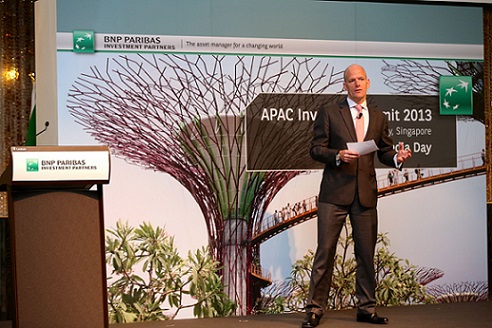Alt Investments
GUEST ARTICLE: Asian Investors Eyeing Stocks, Simple Strategies

After a period of caution, Asia-based investors are raising their risk appetites but not yet shifting significantly from fixed income to equities, BNP Paribas says in this commentary.
After several years of caution, Asian investors are starting to show more interest in equities and are feeling more comfortable with upping their risk appetites, according to a recent survey conducted during the BNP Paribas Investment Partners APAC Investor Summit. But while the comfort level is increasing, investors have yet to start shifting from fixed income into equities. Meanwhile, the focus is still on straightforward, traditional investment products and strategies.
These findings are from BNP Paribas IP’s annual investor meeting last month in Singapore. The meeting is organised for 100 of the firm’s key clients, including institutional investors and distributors, such as retail banks, private banks and brokers from 10 markets around the region.
Not yet fully embracing equities
Survey results show that 64 per cent of clients believe equities offer the best investment opportunities for the second half of this year. Investors are quite bearish on the prospects for money market, commodities and fixed income funds. But while investors are signalling a preference for equities, the majority of fund flows are still going to fixed income funds so far this year. Clearly, investors are waiting for some kind of catalyst or sign. These are investors who have started to tiptoe back into equities but are hedging their bets and easing into the asset class through multi-asset funds. Dividend paying funds are also gaining popularity as investors are seeking more straightforward products that have regular payouts.
Even with the growing interest in equities, BNP Paribas IP’s clients don’t see fixed income going away. “People are more aware and more mature when it comes to investing. In many ways, the crisis helped push consumers to take a more balanced view of their investments,” said Mark te Riele, head of marketing and distribution for Asia Pacific at BNP Paribas IP.
Asian investors, like their counterparts around the world, have a home bias so it wasn’t surprising to see that 75 per cent of those surveyed believe Asia offers the best investment opportunity in the mid- to long-term. Within Asia, China is an important market, with 69 per cent of clients saying that allocation to China should be more than 10 per cent. Only 31 per cent of clients said allocation to China should be 10 per cent or below. To compare, the current weight of Chinese holdings in the MSCI ACWI is 3.1 per cent.
In one surprise, only 26 per cent of clients listed China as the most attractive opportunity over the coming year while 39 per cent of clients said investors put Indonesia at the top on their lists. This was a change from previous years when China was number one. It seems China’s lacklustre equities market and concerns about slowing growth appears to have put a bit of a damper on investor enthusiasm.
The survey results came to light during the meeting’s New G7 Emerging Markets Summit, during which colleagues from Brazil, China, India, Indonesia, South Korea, Russia and Turkey each gave a five-minute pitch about their markets.
BNP Paribas IP has long been bullish on Indonesia’s potential. The country has shown stable, high growth over a long period of time and has been one of the best performing markets, if not the best market, in the region over the last year. Indonesia is also finally seeing positive news flow after being overshadowed by news of natural disasters or corruption. Research shows that Indonesia has been one of the least affected economies by the global slowdown. The country has a huge domestic consumption base and the increasing wealth of the middle class gives it a strong driver for the economy.
In one of the most surprising results from the poll, 9 per cent of clients listed Europe as a top choice. BNPP IP believes some European companies are being overlooked because of concerns over the continent’s debt crisis. Many European companies are successful global companies with abundant emerging market exposure and are thus not terribly affected by the European debt crisis.
Challenges
Since the global financial crisis, the asset management industry in Asia has been grappling with changes – from swings in investors’ risk appetite to a tightened regulatory environment and increased competition. The survey showed that regaining investors’ trust and confidence remains a primary goal.
In perhaps the biggest surprise of the survey, 47 per cent of those polled said a clear and simple strategy and positioning of a product was the most important consideration when choosing an asset manager, even more important than performance. The emphasis on clear and simple strategy goes to highlight the importance of trust.
“People these days are not satisfied with just performance. They want greater understanding and knowledge about investment products. People won’t be fooled with just a high number, they want to know where it comes from,” te Riele said.
In Asia, the penetration of wealth products as a percentage of household financial assets is relatively low compared with Europe or North America. Clients listed increased education and fostering trust as the top two drivers for growth. Better training of relationship managers and prime brokers is seen as another important growth driver.
The tightened regulatory environment continues to be tough for the industry and 45 per cent of those polled listed increased regulatory burdens as their biggest challenge. Finding new, differentiated products was seen as the second biggest challenge and increasing competition the third.
As of March 2013, BNP Paribas IP manages €47.1 billion ($63 billion) of assets in Asia-Pacific. BNP Paribas IP has had a presence in Asia-Pacific since 1992 and currently has 850 full-time employees, including 200 investment professionals.